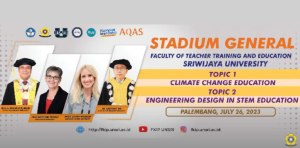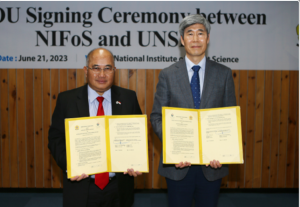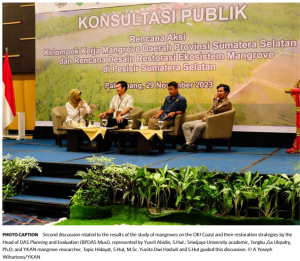
SDG 13 – Indicator 13.3.1 Local education programmes on climate
Education is a crucial element in addressing the climate crisis and achieving the Sustainable Development Goals (SDGs). By fostering environmental literacy, education empowers individuals to comprehend the causes and consequences of climate change, inspiring them to adopt sustainable practices aligned with the SDGs. Integrating climate change education into curricula across disciplines equips students with the knowledge and skills necessary to navigate the complexities of this global challenge, contributing to SDG 4 (Quality Education) and SDG 13 (Climate Action). Furthermore, education can cultivate critical thinking, problem-solving abilities, and a sense of responsibility towards environmental stewardship, promoting progress across various other SDGs, such as SDG 12 (Responsible Consumption and Production) and SDG 15 (Life on Land). Ultimately, by promoting awareness, understanding, and action, education plays a pivotal role in building a climate-resilient and sustainable future for all.

In mid-2023, the Faculty of Teacher Training and Education (FKIP) at Sriwijaya University (Unsri) held a Studium Generale event focused on Climate Education. To provide expert insights, they invited two distinguished speakers: Dr. Laura Wheeker from Brigham Young University and Dr. Kathy Cabe Trundle from Sriwijaya University. Their presentation was titled “Indonesian Preservice Teachers and Climate Change”, addressing the crucial role of educators in understanding and responding to climate change. (https://www.youtube.com/watch?v=4uYe6ZXiC3Y)
Researchers from the Faculty of Teacher Training and Education (FKIP) at Sriwijaya University (Unsri) conducted a study on the role of eduparks in education. Their research focused on analyzing the importance of eduparks in providing practical, hands-on learning experiences for educators and students. Utilizing a SWOT (Strengths, Weaknesses, Opportunities, Threats) analysis framework, the researchers investigated several key aspects of a successful edupark. Their findings highlighted the critical need for:
Sufficient Education Centers: A diverse range of education centers within the edupark is essential to cater to the diverse learning needs of visitors. These centers could include museums, science labs, interactive exhibits, and workshops focused on various educational disciplines.
Relevant Study Programs: The study emphasized the importance of aligning the edupark’s offerings with relevant study programs for aspiring educators. This alignment ensures that future teachers gain practical experience and exposure to innovative teaching methodologies within the edupark setting.
Meeting Visitor Needs: The researchers stressed the significance of eduparks in effectively meeting the needs of their visitors. This involves providing accessible, engaging, and informative learning experiences that cater to different age groups, interests, and learning styles. By addressing these critical factors, eduparks can play a vital role in enhancing education and promoting a culture of lifelong learning ( https://openaccessojs.com/JBReview/article/view/1597 ).
Universitas Sriwijaya also provides graduate programs in environmental education, including master’s and doctoral degrees, focusing on climate change. (https://pps.unsri.ac.id/program-studi-pengelolaan-lingkungan/) (https://pps.unsri.ac.id/ilmu-lingkungan/).
Students in these programs learn about climate change issues, conduct research on related topics, and present their findings in theses and dissertations. The programs also actively promote awareness of climate change risks, impacts, and solutions through various outreach activities like webinars and seminars.
Research within these programs explores climate change solutions and mitigation strategies, with students producing in-depth theses and dissertations. Universitas Sriwijaya collaborates with external organizations to extend its influence and contribute to climate change initiatives. These partnerships help in developing and implementing early warning systems for climate-related disasters. Overall, the university is dedicated to fostering environmental leadership and addressing climate change challenges through education, research, and collaboration.
SDG 13 – Indicator 13.3.2 Climate Action Plan, shared
Universitas Sriwijaya (Unsri) actively conducts various research and community engagement initiatives related to climate change issues. Through these efforts, Unsri aims to contribute valuable insights and practical solutions to address the challenges posed by climate change. Researchers and experts at Unsri collaborate on projects focusing on climate change adaptation, mitigation strategies, environmental conservation, and sustainable development. Additionally, the university actively engages with local communities, policymakers, and non-governmental organizations to raise awareness about climate change impacts and promote environmentally friendly practices. Unsri’s commitment to research and community outreach underscores its dedication to finding innovative solutions and creating positive change in the face of climate change.
A delegation from Sriwijaya University, led by the Vice-Rector for Planning and Cooperation, visited the National Institute of Forest Science (NIFoS) in Seoul, South Korea from June 20th to 24th, 2023. This visit was part of the Unsri’s climate action plan, specifically focusing on the University’s internationalization efforts. During the visit, a Memorandum of Understanding (MoU) was signed between UNSRI and NIFoS to foster collaborative research, scientific conferences, exchange programs, and initiatives related to climate action. The MoU also outlines areas of cooperation, including collaborative research projects, joint scientific events, information exchange, personnel exchange, and other mutually beneficial programs.

Link:
SDG 13 – Indicator 13.3.3 Co-operative planning for climate change disasters
The Mangrove Ecosystem Restoration Alliance (MERA) Program, facilitated by the Yayasan Konservasi Alam Nusantara (YKAN), is actively supporting mangrove ecosystem rehabilitation and restoration efforts in South Sumatra, Indonesia. These crucial efforts are being spearheaded by the South Sumatra Provincial Forestry Service and the Watershed Management Agency (BPDAS) Musi.
A key component of the MERA Program is the development of a comprehensive Ecosystem Restoration Plan Document specifically tailored for South Sumatra, with a primary focus on the coastal region of Ogan Komering Ilir Regency (OKI). Sriwijaya University (UNSRI) and YKAN initiated the drafting of this plan before 2023.
To ensure a holistic and well-informed approach to restoration, the plan’s development involved extensive and comprehensive field studies conducted along the OKI Coast. These studies encompassed a range of crucial analyses, including:
- Ecological analysis: Assessing the current state of the mangrove ecosystem, identifying key threats and challenges, and mapping areas for restoration.
- Social analysis: Understanding the social dynamics, community dependence on mangroves, and potential impacts of restoration on local communities.
- Economic analysis: Evaluating the economic benefits of mangrove restoration, including fisheries, coastal protection, and tourism potential.

Link:
SDG 13 – Indicator 13.3.4 Inform and support government
Sriwijaya University (UNSRI) recently celebrated its 63rd anniversary. As part of the celebrations, the Faculty of Economics organized a scientific discussion focused on using resources to achieve Sustainable Development Goals (SDGs) in rural areas. This event was held on November 6, 2023, at the Magister Manajemen UNSRI Auditorium on the Bukit Besar Palembang Campus.
The main objective of the discussion was to explore how existing resources in villages can be utilized effectively. This aligns with the Village SDGs initiative, which has 18 key programs aimed at improving rural communities. These programs include goals like eliminating poverty and hunger in villages.
Prof. Dr. Paiman Raharjo, the Deputy Minister of Villages of the Republic of Indonesia, expressed his hope that the event would raise awareness about sustainable development and its importance for communities. He emphasized the need to align these efforts with the “Nawa Cita,” the nine national priorities set by the Indonesian President.
Prof. Raharjo highlighted that one of the key priorities of the Nawa Cita is to develop communities from the ground up, starting with rural areas. Villages are a central focus in the government’s efforts to reduce poverty, leading to significant funding allocations for poverty eradication programs in these areas.
Link:
SDG 13 – Indicator 13.3.5 Environmental education collaborate with NGO
The Hutan Kita Institute (HaKi) in Palembang, Indonesia, focuses on sustainable forest ecosystems. Prof. Rujito, Chair of the Social Forestry Acceleration Working Group, recommends several strategies to address challenges in Social Forestry in South Sumatra. These include broader stakeholder engagement, resolving land conflicts, strengthening institutions of permit holders, supporting business development, ensuring financial obligations are met, facilitating conservation initiatives, and promoting educational and research activities related to Social Forestry. His recommendations aim to improve the management and sustainability of Social Forestry for the benefit of both the environment and local communities.
Links:
- https://hutaninstitute.or.id/tantangan-dan-rekomendasi-perhutanan-sosial-di-sumatera-selatan/
- https://www.cifor-icraf.org/news/corporate-news/universitas-sriwijaya-and-cifor-icraf-to-continue-working-together-on-landscape-restoration-and-other-critical-issues/?utm_source=site-search&utm_medium=cifor-icraf-website&utm_campaign=traffic-source
A renewed formal collaboration between the university and the Center for International Forestry Research and World Agroforestry (CIFOR-ICRAF) will stimulate research into ways to effectively and efficiently restore landscapes and address other critical issues.
Universitas Sriwijaya is based in Palembang, in Indonesia’s South Sumatra Province, which has hundreds of thousands of hectares of degraded peatland. The renewed research agreement contributes to the global community’s effort to intensify restoration of the world’s degraded land through mechanisms such as the Land Degradation Neutrality framework of the United Nations Convention to Combat Desertification and the Bonn Challenge. The agreement also contributes specifically to the Government of Indonesia’s efforts to restore an estimated 12 million hectares of degraded land by 2030, of which 2 million is degraded peatland. Research into site-specific techniques, especially in populated landscapes, is crucial for ensuring the success of such programmes; many restoration projects have failed by not fully understanding their landscape and the people in it.
Achieving this ambition in a mere seven years will require all stakeholders to work together in a coordinated manner, with appropriate funding, monitoring and adjustments. The two organizations are keen to assist the government achieve its goals through applied research into new restoration methods – particularly those suited to degraded peatland – and ways of increasing the scale of successful methods efficiently and effectively.
The collaboration document, in the form of a memorandum of understanding (MoU), was signed by the Rector of Universitas Sriwijaya Anis Saggaff and CIFOR-ICRAF’s Chief Operating Officer Robert Nasi at the university’s campus in Palembang on 21 August 2023.
